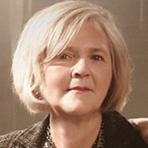Specialty
Elizabeth Blackburn
Cancer Research & Telomeres
Self Exam
- Occupation: Scientist
- Alternative career choice: Musician
- What do rock stars and scienctists have in common: Creativity
- Musical Instrument I Play: Piano
- I tend to approach life: As it comes
- Biggest misconceptions about me or my work: That it is routine and dull
- Worst part-time job ever: Temporary accountant in a bakery – I was so bored with using the adding machine for invoices that I chose to do all the additions in my head, just to keep myself challenged.
- Longest med school study session: Never went to medical school – went to graduate school for my Ph.D.
- Best moment in medicine/research: Discovery of enzyme telomerase – a completely new kind of enzyme!
About My Research
Disease Area: Cancer and aging – the biological principles underlying cancer and how aging makes people more likely to develop cancer
Research Area: How the ends of chromosomes protect the genetic material and protect cells from losing the ability to replenish.
Science Impact/Accomplishments or Goal: Discovery of the molecular nature of telomeres, the protective tips at the ends of chromosomes, and discovery of the enzyme telomerase, which can build telomeres back when they erode away.
Research Description: My current research explores the molecular interactions of telomeres and telomerase, and the clinical impact of insufficient telomere maintenance in humans. We are now beginning to test whether telomere loss - and therefore the risks of certain diseases of aging, such as cancer, cardiovascular disease or diabetes - can be slowed down or reversed.
Biography
“Elizabeth H. Blackburn, Ph.D., is the recipient of the 2009 Nobel Prize in Physiology or Medicine for her discoveries in telomere biology that have uncovered a new understanding of normal cell functioning and given rise to a growing field of inquiry.
Throughout her distinguished career, whether as the editor of high-profile scientific journals, such as Molecular Cancer Research and Molecular Biology of the Cell, or as a current member of over 30 distinct institutional advisory boards or review committees, Dr. Elizabeth Blackburn has spent countless hours in service to her constituency. Further, she has held leadership positions in several scientific societies, including her current appointment as President of the American Association for Cancer Research.
Dr. Blackburn has been recognized for her seminal contribution to the field of telomere biology with numerous prizes, awards, and honorary degrees, including the 2006 Albert Lasker Award for Basic Medical Research and elections to the American Association for the Advancement of Science and the Institute of Medicine. In 2007, Time magazine named her one of the ‘100 Most Influential People in the World,’ and in 2008 she was the North American Laureate for the L’Oreal_UNESCO For Women In Science. The scientific community bestowed upon her the ultimate recognition of her legacy by honoring Dr. Elizabeth Blackburn with the 2009 Nobel Prize in Physiology or Medicine.
Dr. Blackburn is currently the Morris Herzstein Endowed Chair in Biology and Physiology in the Department of Biochemistry and Biophysics at the University of California, San Francisco. She is also a NonResident Fellow of the Salk Institute. “




